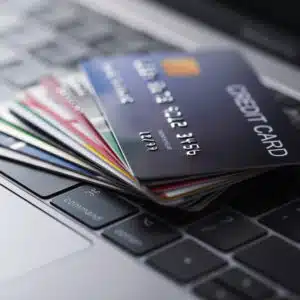When it comes to excuses consumers give for their poor credit scores, banks and lenders have heard it all.
Maybe you lost your job and couldn’t pay your student loan payment for a few months. Or perhaps you thought you’d gotten a deferment but were too busy job hunting to find out for sure.
Maybe you thought you paid your credit card bill but it’s actually sitting on your kitchen counter waiting for the mail.
Whatever the reason for your low credit score, one thing is for certain — lenders don’t care.
In fact, banks and other lenders lean on your credit score and other factors to determine whether they should approve you for a credit card or a loan — and that’s about it. Your personal situation is never considered, nor should it be.
It would be wonderful if credit card companies understood that “life happens” and made special exceptions to help people out, but that’s not the world we live in.
As most of us already know, that’s not typically how credit works. Credit cards are backed by banks, and banks have rules for a reason.
Now, here’s the good news: Credit cards can help rebuild your credit, earn cash back for each dollar you spend, make travel easier, and serve as an emergency fund if you’re stuck paying a huge bill at the last minute.
This is true even if you have poor credit, although the selection of credit cards you can qualify for may be somewhat limited.
Keep reading to learn about the best credit cards for bad credit, how they work, and how you can get approved.
Table of Contents
Best Cards for Bad Credit This Year
Before you give up on building credit, you should check out all the credit cards that are available to consumers who need some help. Our list of the best credit cards for bad credit includes some of the top offers with the lowest fees and fair terms.
- Total Visa®
- Discover it® Secured
- Credit One Bank® Visa® Credit Card
- Secured Mastercard® from Capital One®
- Milestone® Gold Mastercard®
- Credit One Bank® Unsecured Visa® with Cash Back Rewards
#1: Total Visa®
The Total Visa® is one of the easiest credit cards to get approved for in today’s market, and it’s easy to use all over the world since it’s a true Visa credit card. However, this card does come with high rates and fees since it’s available to consumers with poor credit or a limited credit history.
Processing your application will cost $89, which is extremely high when you consider the fact that most credit cards don’t charge an application fee. You’ll also pay an initial annual fee of $75 and a $48 annual fee for each year thereafter.
For the most part, the Total Visa® is best for consumers who don’t mind paying a few fees to access an unsecured line of credit. Since this card doesn’t dole out rewards, however, there are few cardholder perks to look forward to.
- APR: 35.99% APR
- Fees: Application fee and annual fee
- Minimum Credit Score: Not specified
- Rewards: No
#2: Discover it® Secured
While secured cards don’t offer an unsecured line of credit like unsecured credit cards do, they are extremely easy to qualify for.
The Discover it® Secured may not be ideal for everyone, but it does offer a simple online application process and the ability to get approved with little to no credit history.
Keep in mind, however, that secured cards do work differently than traditional credit cards. With a secured credit card, you’re required to put down a cash deposit upfront as collateral. However, you will get your cash deposit back when you close your account in good standing.
Amazingly, the Discover it® Secured lets you earn rewards with no annual fee. You’ll start by earning 2% back on up to $1,000 spent each quarter on dining and gas. You’ll also earn an unlimited 1% back on everything else you buy.
The Discover it® Secured doesn’t charge an application fee or an annual fee, although you’ll need to come up with the cash for your initial deposit upfront. For the most part, this card is best for consumers who have little to no credit and want to build their credit history while earning rewards.
- APR: 24.74%
- Fees: No annual fee or monthly fees
- Minimum Credit Score: Not specified
- Rewards: Yes
#3: Credit One Bank® Visa® Credit Card
The Credit One Bank® Visa® Credit Card is another credit card for bad credit that lets you earn rewards on your everyday spending. You’ll earn a flat 1% cash back for every dollar you spend with this credit card, and since it’s unsecured, you don’t have to put down a cash deposit to get started.
Other benefits include the fact you can get pre-qualified for this card online without a hard inquiry on your credit report — and that you get a free copy of your Experian credit score on your online account management page.
You may be required to pay an annual fee up to $95 for this card for the first year, but it depends on your creditworthiness. After that, your annual fee could be between $0 and $99.
- APR: 19.99% to 25.99%
- Fees: Annual fee up to $95 the first year depending on creditworthiness; after that $0 to $99
- Minimum Credit Score: Not specified
- Rewards: Yes
#4: Secured Mastercard® from Capital One®
The Secured Mastercard® from Capital One® is another secured credit card that extends a line of credit to consumers who can put down a cash deposit as collateral. This card is geared to people with bad credit or no credit history, so it’s easy to get approved for.
One downside, however, is that your initial line of credit will likely be just $200 — and that doesn’t give you much to work with.
On the upside, this card doesn’t charge an annual fee or any application fees. That makes it a good option if you don’t want to pay any fees you won’t get back.
You’ll also get access to 24/7 customer service, $0 fraud liability, and other cardholder perks.
- APR: 26.49%
- Fees: No ongoing fees
- Minimum Credit Score: Not specified
- Rewards: No
#5: Milestone® Gold Mastercard®
The Milestone® Gold Mastercard® is an unsecured credit card that lets you get pre-qualified online without a hard inquiry on your credit report.
You won’t earn any rewards on your purchases, but you do get benefits like the ability to select your card’s design, chip, and pin technology, and easy online account access.
You will have to pay a one-time fee of $25 to open your account, and there’s an annual fee of $50 for the first year and $99 for each year after that.
- APR: 24.90%
- Fees: Account opening fee and annual fees
- Minimum Credit Score: Not specified
- Rewards: No
#6: Credit One Bank® Unsecured Visa® with Cash Back Rewards
The Credit One Bank® Unsecured Visa® with Cash Back Rewards lets you earn 1% back on every purchase you make with no limits or exclusions. There’s no annual fee or application fee either, which makes this card a winner for consumers who don’t want to get hit with a lot of out-of-pocket costs.
As a cardholder, you’ll get free access to your Experian credit score, zero fraud liability, and access to a mobile app that makes tracking your purchases and rewards a breeze. You can also get pre-qualified online without a hard inquiry on your credit report.
- APR: 25.99%
- Fees: No annual fee or application fee
- Minimum Credit Score: Not specified
- Rewards: Yes
Best Cards for Bad Credit This Year
| CARD NAME | KEY FEATURES |
|---|---|
| Total Visa® | Easiest Approval for Poor Credit, True Visa Credit Card, On-Time Payments Reported, High Rates/Fees, No Rewards |
| Discover It® Secured | Easy Qualification, Secured Card, Rewards Program, No Annual/Monthly Fees |
| Credit One Bank® Visa® | Unsecured Card With Cash Back Rewards, Pre-qualification, Experian Credit Score, Annual Fee Varies |
| Secured Mastercard® From Capital One® | Secured Card, $200 Initial Credit, No Fees, 24/7 Service, No Rewards |
| Milestone® Gold Mastercard® | Unsecured Card, No Rewards, Pre-Qualification, Annual/Account Opening Fees |
| Credit One Bank® Unsecured Visa® | Unsecured Card, 1% Cash Back, No Fees, Experian Score Access, Mobile App, Fraud Liability |
The Downside of Credit Cards With Bad Credit
While your odds of getting approved for one of the credit cards for bad credit listed above are high, you should be aware that there are plenty of pitfalls to be aware of.
Here are the major downsides you’ll find with these credit cards for bad credit and other comparable cards:
- Higher Fees: While someone with excellent credit can shop around for credit cards without any fees, this isn’t the case of you have bad credit. If your credit score is poor or you have a thin credit profile, you should expect to pay higher fees and more of them.
- Higher Interest Rates: While some credit cards come with 0% interest for a limited time or lower interest rates overall, consumers with poor credit typically have to pay the highest interest rates available today. Some credit cards for bad credit even come with APRs as high as 35%.
- No Perks: Looking for cardholder benefits like cash back on purchases or points toward airfare or movie tickets? You’ll need to wait until your credit score climbs back into “good” or “great” territory. Even if you can find a card for applicants with bad credit that offers cash back, your rewards may not make up for the higher fees.
- No Balance Transfers: If you’re looking for relief from other out-of-control credit card balances, look elsewhere. Credit cards for bad credit typically don’t offer balance transfers. If they do, the terms make them cost-prohibitive.
- Low Credit Limits: Credit cards for bad credit tend to offer initial credit limits in the $300 to $500 range with the possibility of increasing to $2,000 after a year of on-time monthly payments. If you need to borrow a lot more than that, you’ll have to consider other options.
- Security Deposit Requirement: Secured credit cards require you to put down a cash deposit to secure your line of credit. While this shouldn’t necessarily be a deal-breaker — and it may be required if you can’t get approved for an unsecured credit card — you’ll need to come up with a few hundred dollars before you apply.
- Checking Account Requirement: Most new credit card accounts now require cardholders to pay bills online, which means you’ll need a checking account. If you’re mostly “unbanked,” you may need to open a traditional bank account before you apply.
Benefits of Improving Your Credit Score
People with bad credit often consider their personal finances a lost cause. The road to better credit can seem long and stressful, and it’s sometimes easier to give up than it is to try to fix credit mistakes you’ve made in the past.
But, there are some real advantages that come with having at least “good” credit, which typically means any FICO score of 670 or above.
Here are some of the real-life benefits better credit can mean for your life and your lifestyle:
- Higher Credit Limits: The higher your credit score goes, the more money banks are typically willing to lend. With good credit, you’ll have a better chance of qualifying for a car loan, taking out a personal loan, or getting a credit card with a reasonable limit.
- Lower Interest Rates: A higher credit score tells lenders you’re not as risky as a borrower —a sign that typically translates into lower interest rates. When you pay a lower APR each time you borrow, you can save huge amounts of money on interest over time.
- Lower Payments: Borrowing money with a lower interest rate typically means you can usually get lower payments all your loans, including a home loan or a car loan.
- Ability to Shop Around: When you’re an ideal candidate for a loan, you can shop around to get the best deals on credit cards, mortgages, personal loans, and more.
- Ability to Help Others: If your kid wants to buy a car but doesn’t have any credit history, better credit puts you in the position to help him or her out. If your credit is poor, you won’t be in a position to help anyone.
- More Options In Life: Your credit score can also impact your ability to open a bank account or rent a new apartment. Since employers can request to see a modified version of your credit report before they hire you, excellent credit can also give you a leg up when it comes to beating out other candidates for a job.
In addition to the benefits listed above, most insurance companies now consider your credit score when you apply for coverage. For that reason, life, auto, and home insurance rates tend to be lower for people with higher credit scores.
This may seem unfair, but you have to remember that research has shown people with high credit scores tend to file fewer insurance claims.
The Downside and Benefits of Credit Cards With Bad Credit
| DOWNSIDE | BENEFITS |
|---|---|
| Higher Fees | Higher Credit Limits |
| Higher Interest Rates | Lower Interest Rates |
| No Perks | Lower Payments |
| No Balance Transfers | Ability to Shop Around |
| Low Credit Limits | Ability to Help Others |
| Security Deposit Requirement | More Options in Life |
| Checking Account Requirement |
How to Improve Your Credit: Slow and Steady
When you have a low credit score, there are two ways to handle it. If you don’t mind the consequences of poor credit enough to do anything about it, you can wait a decade until the bad marks age off your credit report.
Depending on when your creditors give up and write off your debt, you may not even need to wait that long.
If you don’t like the idea of letting your credit decay while you wait it out, you can also try to fix your past credit mistakes. This typically means paying off debt — and especially delinquent debts — but it can also mean applying for new loan products that are geared to people who need to repair their credit.
If you decide to take actionable steps to build credit fast, the credit cards on this page can help. They’ll give you an opportunity to show the credit bureaus that you’ve changed your ways.
Before you take steps to improve your credit score, however, keep in mind all the different factors used to determine your standing in the first place.
The FICO scoring method considers the following factors when assigning your score:
- On-time Payments: Paying all your bills on time, including credit cards, makes up 35% of your FICO score. For that reason, paying all your bills early or on time is absolutely essential.
- Outstanding Debts: How much you owe matters, which is why paying off your credit cards each month or as often as possible helps your score. According to myFICO.com, the amounts you owe in relation to your credit limits make up another 30% of your FICO score.
- New Credit: Applying for too many new cards or accounts at once can impact your score in a negative way. In fact, this determinant makes up another 10% of your FICO score.
- Credit Mix: Having a variety of open accounts impresses the credit bureau algorithm Gods. If all you have are personal loans right now, mixing in a credit card can help. If you already have four or five credit cards, it may be wise to back off a little.
- Length of Credit History: The length of your credit history also plays a role in your score. The longer your credit history, the better off you are.
If you want to improve your credit score, consider all the factors above and how you can change your behavior to score higher in each category.
It’s pretty easy to see how paying all your bills early or on time and paying off debt could make a big positive impact on your credit score when you consider that these two factors alone make up 65% of your FICO score.
If you want a way to track your progress, also look into an app like Credit Karma, one of my favorite tools. This app lets you monitor your credit progress over time and even receive notifications when your score has changed. Best of all, it’s free.
Should You Use a Credit Card to Rebuild Your Credit Score?
If you’re on the fence about picking up a credit card for bad credit, your first step should be thinking over your goals. What exactly are you trying to accomplish?
If you’re looking for spending power, the cards on this list probably won’t help. Some are secured cards, meaning you need a cash deposit to put down as collateral. Others offer low credit limits and high fees and interest rates, making them costly to use over the long-term.
If you really want to start over from scratch and repair credit mistakes made in the past, on the other hand, one of these cards may be exactly what you need. If you’re determined to improve your score, they can speed things along.
You may pay higher fees and interest rates along the way, but it’s important to remember that none of the cards on this list need to be your top card forever. Ideally, you’ll use a credit card for poor credit to rebuild your credit and boost your score.
Once you’ve reached your goal, you can upgrade to a new card with better benefits and terms.
Final Thoughts – Best Credit Cards for Bad Credit
Rebuilding credit requires strategic choices. While credit cards for bad credit offer a chance to improve scores, drawbacks exist. Higher fees and interest rates, lower credit limits, and limited perks are common.
However, these cards offer a chance to change your credit behavior, demonstrating timely payments and reducing debt. Patience and consistent effort are key to score improvement. Aiming for good credit opens doors to higher limits, lower rates, and better options.
Evaluate your goals and financial situation to determine if these credit cards align with your objectives. With responsible use, they can pave the way toward better credit.








FIT MasterCard does have an $89 application fee, please correct your information. I appreciated your story.